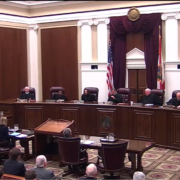Proposed Collaborative Law Procedural Rule Published in Florida Bar News
In March of 2016, Florida Governor Rick Scott signed into law the Collaborative Law Process Act (“CLPA”). The CLPA, among other things, protects communications within the collaborative process so that participants can be more open in their discussions and can rest assured that proposals and comments made while trying to reach agreement cannot later be used against them.
However, the CLPA does not go into effect until after the Florida Supreme Court adopts Rules of Professional Conduct and Rules of Procedure.

Proposed rules have been approved by the Florida Board of Governors, and they have been published in the August 15, 2016 edition of the Florida Bar News for comment. Once the comment period is over, the Florida Supreme Court will determine whether it will approve the rules.
You can find the proposed Family Law Rule of Procedure (12.475) after the jump (the Rule of Conduct is published in a separate post):
RULE 12.745. COLLABORATIVE LAW PROCESS
(a) Application. This rule governs all proceedings under Chapter 61, part III, Florida Statutes.
(b) Collaborative Law Process.
(1) Initiating Process.
(A) A collaborative law process begins, regardless of whether a legal proceeding is pending, when the parties sign a collaborative law participation agreement.
(B) When a proceeding is pending before a tribunal, the parties may sign a collaborative law participation agreement to seek to resolve a matter related to the proceeding. The parties shall promptly file with the tribunal a notice of the agreement after it is signed and it shall operate as an application for a stay of the proceeding. A tribunal in which a proceeding is stayed under this subdivision may require the parties and collaborative lawyers to provide a status report on the collaborative law process and the proceeding. The status report may only indicate whether the process is ongoing or concluded and no other information. The status report may not include a report, assessment, recommendation, finding, or other communication regarding a collaborative matter. A tribunal shall provide notice to the parties and an opportunity to be heard before dismissing a proceeding, in which a notice of collaborative process is filed, based on delay or failure to prosecute. A tribunal may not consider a communication made in violation of this subdivision.
(2) Concluding and Terminating Process. A collaborative law process is concluded by:
(A) the resolution of a collaborative matter as evidenced by a signed record;
(B) the resolution of a part of the collaborative matter, evidenced by a signed record, in which the parties agree that the remaining parts of the matter will not be resolved in the process;
(C) a party unilaterally terminating the collaborative law process, with or without cause, by
(i) giving notice to other parties in a record that the process is ended,
(ii) beginning a contested proceeding related to a collaborative matter without the agreement of all parties, or
(iii) in a pending proceeding related to the matter:
a. initiating a pleading, motion, order to show cause, or request for a conference with the tribunal;
b. requesting that the proceeding be put on the tribunal’s active calendar; or
c. taking similar action requiring notice to be sent to the parties; or
(D) except as otherwise provided by subdivision (b)(3), a party discharging a collaborative lawyer or a collaborative lawyer withdrawing from further representation of a party.
If a proceeding is pending before a tribunal, the parties shall promptly file with the tribunal notice in a record when a collaborative law process concludes. Any stay of the proceeding is lifted when the notice is filed. The notice may not specify any reason for termination of the process.
(3) Discharge or Withdrawal from Representation. A party’s collaborative lawyer shall give prompt notice to all other parties in a record of a discharge or withdrawal. If a proceeding was pending prior to the initiation of the collaborative process, the party’s collaborative lawyer shall comply with the requirements of Florida Rule of Judicial Administration 2.505. Notwithstanding the discharge or withdrawal of a collaborative lawyer, a collaborative law process continues, if not later than 30 days after the date that the notice of the discharge or withdrawal of a collaborative lawyer is sent to the parties:
(A) the unrepresented party retains a successor collaborative lawyer; and
(B) in a signed record:
(i) the parties consent to continue the process by reaffirming the collaborative law participation agreement; and
(ii) the agreement is amended to identify the successor collaborative lawyer and the successor attorney signs the participation agreement.
(c) Approval of Interim Agreements. A collaborative law process does not conclude if, with the consent of the parties, a party requests a tribunal to approve a written agreement resolving an issue in the collaborative matter while other issues remain pending.
(d) Alternative Dispute Resolution Permitted. Nothing in this rule shall be construed to prohibit the parties from using, by mutual agreement, any other permissible form of alternative dispute resolution to reach a settlement on any of the issues included in the collaborative process.
(e) Emergency Order. During a collaborative law process, a tribunal may issue emergency orders to protect the health, safety, welfare, or interest of a party or a family or household member as defined in section 741.28, Florida Statutes.
(f) Disqualification of Collaborative Lawyer and Lawyers in Associated Law Firm.
(1) Except as otherwise provided in subdivision (b)(3), a collaborative lawyer is disqualified from appearing before a tribunal to represent a party in a proceeding related to the collaborative matter.
(2) Except as otherwise provided in subdivisions (b)(3) and (c), a lawyer in a law firm with which the collaborative lawyer is associated is disqualified from appearing before a tribunal to represent a party in a proceeding related to the collaborative matter if the collaborative lawyer is disqualified from doing so under subdivision (b)(1).
(3) A collaborative lawyer or a lawyer in a law firm with which the collaborative lawyer is associated may represent a party:
(A) to ask a tribunal to approve an agreement resulting from the collaborative law process; or
(B) to seek or defend an emergency order to protect the health, safety, welfare, or interest of a party, or a family or household member as defined in section 741.28, Florida Statutes, if a successor lawyer is not immediately available to represent that person. In that event, subdivisions (b)(1) and (b)(2) apply when the party or family or household member is represented by a successor lawyer or reasonable measures are taken to protect the health, safety, welfare, or interest of that person.
If you have questions regarding how your family could better resolve its disputes via the collaborative family law process, schedule a consultation with Family Diplomacy: A Collaborative Law Firm at (813) 443-0615 or CLICK HERE to fill out our consultation form.
Adam B. Cordover is co-editor and co-author of an upcoming American Bar Association book on Building A Successful Collaborative Practice. He is a founding a principal trainer of the Tampa Bay Collaborative Trainers and a graduate of the Leadership Academy of the International Academy of Collaborative Professionals.







Leave a Reply
Want to join the discussion?Feel free to contribute!